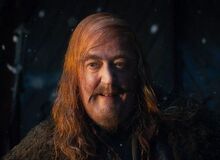The Master of Lake-Town or The Master was the original leader of Laketown, that is, Esgaroth, when Bilbo Baggins and his companions arrived. He is described as being greedy, but not undeserving of his position in terms of intelligence and charisma. In the book, he is portrayed as a close companion to Bard, the captain of the town archers, allowing him to remain in Laketown while the Lakemen recovered from their ordeal with Smaug.
In The Hobbit he is not given an actual name.
Biography
The Master of Laketown ruled from 2920 to 2941 of the Third Age and he would have been approximately thirty years old when he began leadership. This would make him fifty years old at the time of the Battle of the Five Armies and The Quest of Erebor, as these events both occurred in the year 2941. The Master's rule in Laketown was rather amicable, and therefore under his dominion the Men of the Long Lake traded peaceably with the Elves of Mirkwood, creating a steady trade that was kept until 2941, when Thorin and his friends came to wrest dominion of the Lonely Mountain (Erebor) and its riches from Smaug, who had arrived 120 years before the Master's rule, in the year TA 2770.
When the Dwarves arrived, the Master of Laketown greeted them generously, but only to keep public spirits up.[1] After the destruction of Laketown and the slaying of the dragon by Bard, the townspeople denounced the Master as a coward and called for Bard's ascension as King. The Master, who was an adroit politician, shifted blame for Laketown's destruction to Thorin and the dwarves, who had roused the dragon in the first place. This succeeded in turning the townspeople's ire towards the dwarves. Bard took the lead in rebuilding the remains of the town and gathering supplies for the coming winter, but was careful to act in the Master's name, so as not to usurp the latter's authority.[2]
After the Battle of Five Armies, Bard became King of Dale, but gave a generous portion of his share of the Lonely Mountain's treasure (received from Dain II Ironfoot) to the Master, for the re-building of Laketown. Unfortunately, the Master succumbed to greed and fled Laketown with most of the gold, and later died of starvation in the wastes, after being deserted by his companions.[3] He is therefore described as weak, because he is easily overcome by the lust of the treasure Smaug held, and by the dragon-spell.
Portrayal in adaptations
The Hobbit film trilogy

The Master
In Peter Jackson's adaptation of The Hobbit, the Master is played by English actor Stephen Fry.
His portrayal in the movie differs greatly from the book, presenting him as greedy, corrupt and ineffectual.
He shows little interest in any of the problems in Laketown, such as starvation and poverty, caring only about his own prosperity and gain. Upon hearing the complaints about his leadership, he uses a network of informants throughout the city to spy on Bard, who he believes to be the one responsible of the growing threat to his authority.
When the company of Thorin Oakenshield were brought to him after attempting to steal weapons, the Master gave them a hearty welcome to the city, but only after Thorin offered to share the riches of Erebor. He also supplied them with weapons and armor for their quest.
Later, as Bard was making his way to the windlance atop the Masters mansion, guards were sent out to arrest him. When Bard tried to escape, the Master knocked him out and had him incarcerated.
Appearances
- The Hobbit (first appearance)
- The Hobbit: The Desolation of Smaug
- The Hobbit: The Battle of the Five Armies
- LEGO The Hobbit sets
- LEGO The Hobbit: The Video Game
Voice Dubbing actors
| Foreign Language | Voice dubbing artist |
|---|---|
| Portuguese (Brazil) (Television/DVD) | Alfredo Martins |
| Spanish (Latin America) | Alejandro Mayén |
| Spanish (Spain) | Jordi Royo |
| Italian (Italy) | Massimo Lopez |
| German | Waldemar Kobus |
| Polish | Jan Prochyra |
| Czech | Jiří Schwarz |
Play
- In the play adaptation of The Hobbit by Edward Mast, The Master of Laketown is named Maxwell, though this is not considered canon.
References
- ↑ The Hobbit, Chapter X: "A Warm Welcome"
- ↑ The Hobbit, Chapter XIV: "Fire And Water"
- ↑ The Hobbit, Chapter XIX: "The Last Stage"
